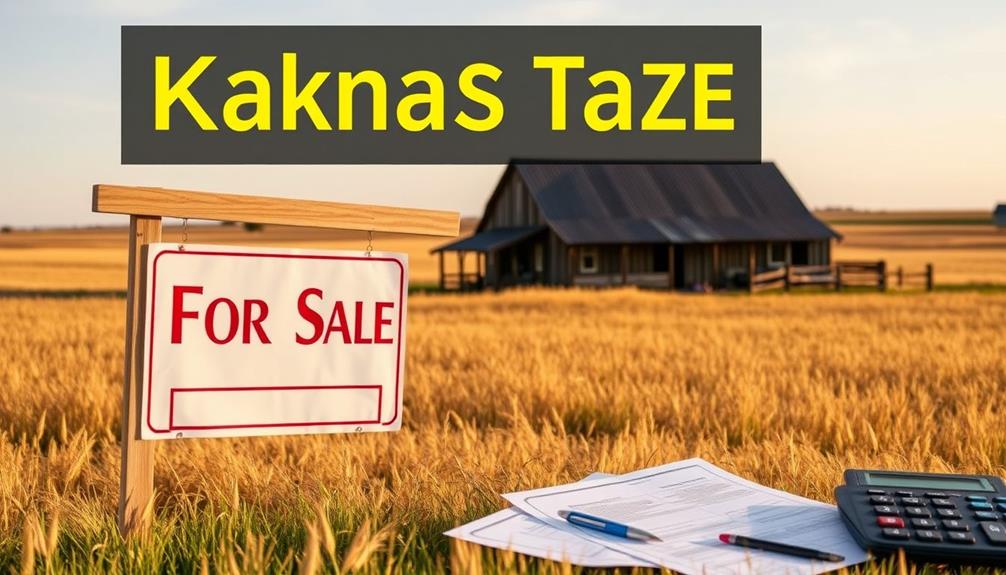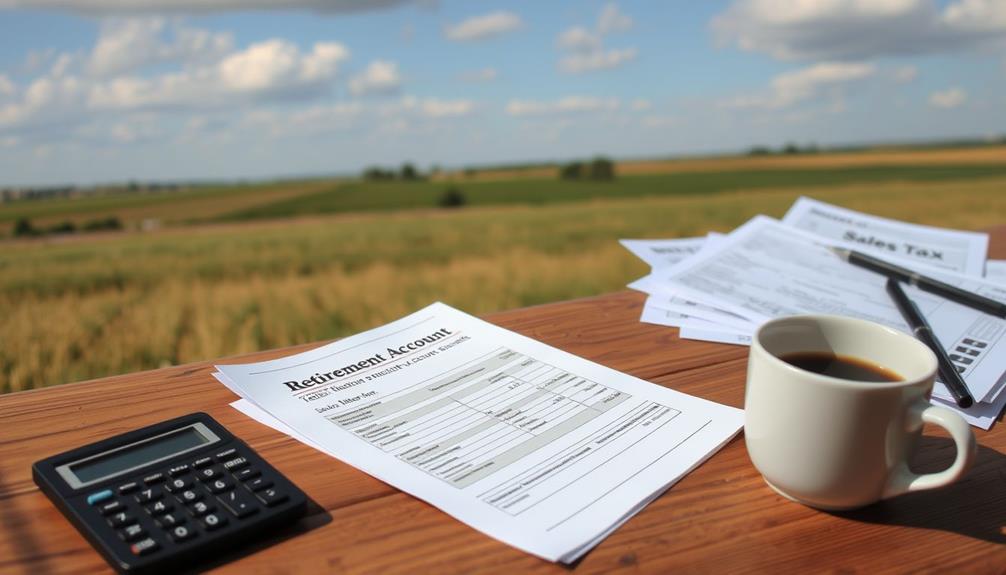When you take money out of your IRA in Kansas, keep in mind that those funds are subject to full taxation at state rates ranging from 3.1% to 5.7%. Kansas does not provide specific exemptions for IRA withdrawals, so it is important to include them in your state tax filings. It is also worth noting that surpassing certain adjusted gross income thresholds can impact your tax obligations. Understanding these factors is crucial for effective financial planning. Properly managing your withdrawals can help minimize tax burdens and maximize your retirement income. To delve deeper into this topic, you may want to conduct further research.
Key Takeaways
- IRA withdrawals in Kansas are fully taxable, with state income tax rates ranging from 3.1% to 5.7%.
- All retirement income sources, including 401(k) withdrawals, must be reported on state tax returns.
- Exceeding the AGI limit of $75,000 results in full taxation of Social Security benefits.
- Strategic timing of withdrawals can help mitigate overall tax liability on retirement income.
- Consulting financial advisors is recommended for optimizing tax strategies related to IRA withdrawals.
Kansas Retirement Tax Overview

When planning for retirement in Kansas, it's vital to understand how state taxes can impact your income. In Kansas, certain types of retirement income are taxable, while others aren't. For instance, if your adjusted gross income (AGI) is $75,000 or less, you won't owe state taxes on your Social Security benefits or public pension income. This can greatly affect your financial planning.
However, you should be aware that withdrawals from 401(k) and IRA accounts are subject to Kansas state income tax, with rates ranging from 3.1% to 5.7%. This means your retirement income from these sources is taxable, and it's important to factor this into your budgeting.
Additionally, property taxes in Kansas can be a concern, as they tend to be higher than the national median, with an effective rate of 1.42%. To help offset these costs, Kansas offers a SAFE Senior property tax refund program, providing potential tax relief for qualifying seniors.
Taxation of IRA Withdrawals

Many retirees may not realize that IRA withdrawals in Kansas are fully taxable, unlike some other forms of retirement income. This means that when you take distributions from your IRA, those amounts are subject to Kansas state income tax, which ranges from 3.1% to 5.7% based on your income level.
It's essential for you to report these IRA withdrawals on your state tax returns, as they can greatly impact your overall tax liability. Unlike Social Security and public pension income, which may have exemptions, standard IRA distributions are fully taxable, making tax planning vital for retirees.
Here's a quick overview of the tax implications:
| Income Level | State Income Tax Rate | Tax Liability on $10,000 Withdrawal |
|---|---|---|
| $0 – $15,000 | 3.1% | $310 |
| $15,001 – $30,000 | 5.25% | $525 |
| $30,001 and above | 5.7% | $570 |
Incorporating tax planning strategies can help mitigate the impact of the taxation of IRA withdrawals, so consider consulting with financial advisors to optimize your financial planning.
Social Security Income in Kansas

In Kansas, your Social Security income is exempt from state taxes if your adjusted gross income (AGI) is $75,000 or less.
If you exceed that limit, you'll face full Kansas state income tax on your benefits.
Understanding how your AGI affects your tax situation is essential for effective retirement planning.
Tax Exemptions Overview
How does Kansas treat Social Security income for seniors? In Kansas, Social Security income is generally exempt from state income taxes for seniors with an adjusted gross income (AGI) of $75,000 or less.
However, if your AGI exceeds this threshold, Kansas state income tax rules dictate that your Social Security benefits will be fully taxed. It's crucial to be aware of how your filing status can impact your overall AGI calculations, as this will directly affect your tax situation.
For your tax planning purposes, consider the following key points:
- AGI Threshold: Stay below the $75,000 AGI limit to enjoy tax exemptions on your Social Security income.
- Tax Implications: Understand that exceeding the AGI threshold can lead to your Social Security benefits becoming taxable.
- No Estate Tax: Kansas doesn't impose an estate or inheritance tax, which can benefit retirees relying on Social Security income.
AGI Impact on Taxation
Understanding the impact of your adjusted gross income (AGI) on taxation is vital for Kansas seniors relying on Social Security income. In Kansas, if your AGI is $75,000 or less, your Social Security benefits remain exempt from state taxes. This means you can enjoy your retirement income without worrying about additional tax implications.
However, if your AGI exceeds $75,000, those benefits become fully taxable under Kansas state income tax. It's important to remember that your AGI includes all sources of income, not just Social Security. Factors like pensions, interest, and other retirement income can push your AGI over that $75,000 threshold.
As a result, you should assess your expected AGI carefully, as this will determine your potential tax liabilities related to your Social Security income. Additionally, your filing status can also influence your AGI calculation, further affecting how much of your Social Security may be taxed.
Other Retirement Income Taxes

When you plan for retirement in Kansas, it's vital to understand how other retirement income is taxed.
Unlike Social Security benefits, which are exempt for certain seniors, withdrawals from 401(k)s and IRAs are subject to state income tax rates ranging from 3.1% to 5.7%.
Proper tax planning can help you navigate these implications and optimize your retirement income strategy.
Kansas Tax Rates Overview
Kansas frequently imposes state income taxes on all sources of income, including IRA withdrawals. As a retiree, it's crucial to understand the state's income tax rates, which range from 3.1% to 5.7%, depending on your income level.
Unlike Social Security and public pension income, which may have exemptions based on income thresholds, your IRA withdrawals will be fully taxable.
When planning your finances, keep in mind these key points:
- Kansas has no specific exemptions for IRA withdrawals.
- Withdrawals must be reported on your state tax returns, affecting your overall tax liability.
- Understanding these tax implications is important for effective financial planning.
With no special deductions available for IRA withdrawals, you need to factor this tax liability into your retirement income strategy.
This means evaluating how much you plan to take from your IRA and how it fits within your overall financial picture. By doing so, you can better prepare for the taxes you'll owe and make the most of your retirement savings in Kansas.
Taxation of Other Income
While IRA withdrawals are a significant source of income in retirement, other types of retirement income can also impact your tax situation in Kansas. Understanding the tax implications of these income sources is essential for effective financial planning.
Here's a breakdown of how various retirement incomes are taxed in Kansas:
| Type of Income | Tax Status in Kansas | Notes |
|---|---|---|
| IRA Withdrawals | Subject to state income tax | Rates range from 3.1% to 5.7% |
| Social Security Income | Exempt from state taxes | Not subject to state income tax |
| Public Pension Income | Exempt from state taxes | Not taxed at the state level |
Unlike Social Security and public pensions, distributions from 401(k) plans and traditional IRAs face no exemptions in Kansas. You'll need to report all IRA withdrawals on your state tax return, which will affect your overall taxable income. Since the state doesn't offer specific deductions or exclusions for retirement account withdrawals, planning your finances carefully is crucial. By understanding these factors, you can navigate the taxes on retirement income more effectively and make informed decisions for your retirement.
Planning for Retirement Taxes
Understanding the tax implications of various retirement income sources can significantly impact your financial strategy. In Kansas, you'll face state income tax on your IRA withdrawals, which can range from 3.1% to 5.7%, depending on your income level.
Unlike Social Security and certain public pension incomes, which may qualify for exemptions, 401(k) and IRA distributions are fully taxable.
To effectively plan for retirement taxes, consider these key factors:
- Withdrawal Timing: Strategically timing your IRA withdrawals can help manage your taxable income.
- Consult Financial Advisors: Engaging with financial advisors can clarify the complexities of tax implications and help optimize your strategies.
- Stay Informed on Legislation: Kansas is exploring legislative changes to retirement income exemptions, which could affect future tax liabilities.
Being proactive about your retirement income and understanding the tax landscape is essential.
As you navigate your financial future, keep in mind that proper planning can lead to more favorable tax outcomes.
Don't overlook the importance of reporting your IRA withdrawals accurately on your state tax returns to avoid unexpected liabilities.
Property Taxes in Kansas

Property taxes in Kansas can be a notable consideration for homeowners, especially given the state's median effective property tax rate of 1.42%, which surpasses the national median of 1.01%.
With the average annual property tax payment around $2,355, it's vital to understand how this impacts your budget.
If you're a senior citizen earning $40,500 or less, you might qualify for the Homestead refund program, which helps reduce your property tax liability. This program can provide critical financial relief, making homeownership more affordable.
Additionally, the SAFESR program offers even more assistance, providing property tax refunds of up to 75% for qualifying seniors.
Despite the higher property tax rates, lower property values in the state help mitigate the overall tax burden for residents.
It's important to stay informed about these programs and exemptions, as they can notably affect your financial situation.
By understanding your property taxes and available relief options, you can make smarter decisions about your home and budget.
Always consult with a tax professional to navigate these opportunities effectively and guarantee you're maximizing your benefits.
Sales Tax Considerations

As you navigate your budget in Kansas, sales tax considerations play a significant role in your overall financial planning. With a state sales tax rate of 6.5%, combined with local taxes, you might face total rates exceeding 11%. This can impact your tax bill, especially if you're relying on retirement income.
Here are a few key points to keep in mind:
- Grocery Tax: Kansas taxes groceries, though this is being phased down to 2% in 2024 and will be eliminated by 2025.
- Capital Gains Tax: Capital gains are taxed as regular income in Kansas, which may affect your financial strategy when withdrawing from retirement accounts.
- Local Variances: Local sales taxes can vary, influencing your daily expenses and overall budget.
Understanding how the state handles taxes is essential for ensuring a comfortable retirement. By factoring in these sales tax implications, you can better predict your expenses and manage your fixed income effectively.
This awareness allows you to make informed decisions about your retirement withdrawals, ultimately supporting your financial stability in Kansas.
Planning for Retirement Taxes

Steering retirement taxes can be just as complex as managing sales tax considerations. In Kansas, state taxes on IRA withdrawals can greatly impact your retirement income.
Unlike Social Security benefits and public pensions, which are exempt for seniors with an adjusted gross income (AGI) below $75,000, your 401(k) and IRA distributions won't qualify for these exemptions. This means every dollar you withdraw from your IRA will be subject to state income tax, with rates ranging from 3.1% to 5.7%, depending on your income level.
As you plan for retirement, it's essential to reflect on the tax liability associated with your withdrawals. Understanding Kansas-specific tax implications helps you develop effective retirement planning strategies.
By working with financial advisors, you can create a tailored plan that minimizes taxes on your IRA withdrawals while maximizing your retirement income. They can guide you in timing your withdrawals and managing your AGI to reduce your overall tax burden.
With careful planning, you'll enhance your financial wellness during your retirement years while steering the complexities of state taxes.
Frequently Asked Questions
Do You Pay State Income Tax on IRA Withdrawals?
Yes, you pay state income tax on IRA withdrawals. These withdrawals are considered taxable income, and you'll need to report them on your state tax return, impacting your overall tax liability for the year.
What Retirement Benefits Are Exempt From Kansas Income Tax?
In Kansas, you won't pay state income tax on Social Security income if your AGI is $75,000 or less, and public pension income is also fully exempt, offering you potential financial relief as a retiree.
What States Require Tax Withholding on IRA Distributions?
Imagine traversing a forest of financial trees. In this landscape, California and New Jersey require tax withholding on IRA distributions, ensuring you're prepared for the journey ahead, while other states may not. Plan wisely!
What Is the Tax Break for Seniors in Kansas?
In Kansas, you can benefit from tax breaks like Social Security exemption if your income's $75,000 or less, full exemption on public pensions, and potential property tax relief through the Homestead refund program.
Conclusion
As you navigate your retirement in Kansas, it's essential to understand how state taxes can impact your IRA withdrawals. Coincidentally, the more you know about these tax implications, the better you can plan your finances. With thoughtful strategies, you can make the most of your retirement income, ensuring those hard-earned savings stretch further. So, take a moment to explore these tax insights—your future self will thank you for the preparation!









